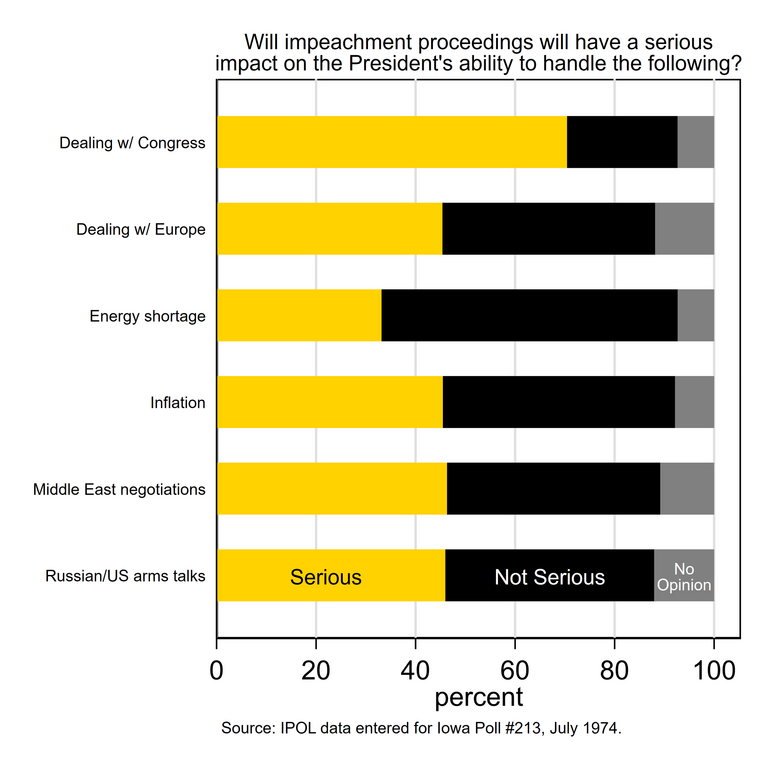Results from Iowa Poll #213, which was conducted about a month before President Richard Nixon’s resignation from office, revealed that Iowans were largely split on whether impeachment proceedings would have a serious impact on Nixon’s ability to handle various issues. Data from Iowa Poll #213, a random sample survey of 601 Iowans in July of 1974, has recently been restored by students in IPOL.

When asked “do you think impeachment proceedings will or will not have a serious impact on the President’s ability to handle the following” including inflation, the energy shortage, dealing with Congress, U.S.-Russia arms limitation talks, Middle East negotiations, and relations with European nations, Iowans were almost evenly split in most categories. For inflation, 45.5% of respondents believed impeachment would have “serious impacts,” while 46.7% responded “not serious.” A similar divide appeared regarding U.S.-Russia arms limitation talks (46.0% yes, 42.0% no), Middle East negotiations (46.3% yes, 42.8% no), and dealing with European nations (45.4% yes, 42.7% no). However, opinions diverged significantly in two categories. On the issue of energy shortages, only 33.2% of Iowans believed impeachment would have “serious impacts,” while 59.5% said “not serious,” and 7.3% had no opinion. The largest gap emerged on the question of impeachment’s impact on dealing with Congress: 70.5% said it would have “serious impacts” while only 22.2% said “not serious.” Similarly to the energy shortage question, 7.4% of Iowans had no opinion on this issue.
When the perceived impact of impeachment on inflation was analyzed by total family income, the results showed general agreement among Iowans across different socioeconomic statuses. Among respondents with an annual family income of under $10,000, 46.5% believed impeachment would have a serious impact, while 43.8% did not. In the $10,000–$24,999 income bracket, 44.6% anticipated serious impacts, compared to 48.4% who did not. Similarly, among those earning $25,000 or more, 44.0% predicted serious impacts, while 50.7% disagreed. The percentage of respondents with no opinion remained relatively consistent across all income levels, ranging from 5.2% (among those earning $25,000+) to 9.7% (among those earning under $10,000).
Iowa Poll #213, conducted by the Des Moines Register, was administered to a random sample of Iowans in July 1974. In addition to the questions about top problems, the survey asked respondents their opinions on a wide variety of topics, including the economy, inflation, tax policy, and multiple sets of questions related to Watergate. Understanding Iowans’ past opinions on these topics can help us understand how perspectives have changed and what ideas have remained popular. IPOL has also been working with UI Libraries and the Des Moines Register to restore data from dozens of Iowa Polls from the 1960s to early 1980s. More information about the project can be found here. We are working to release a full report on our findings as we analyze additional questions.